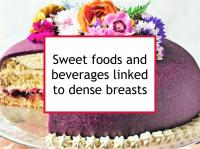Women with mammographically dense breasts have at least four times the risk of breast cancer as those with less dense breasts. However, breast density is not static; it tends to decrease over time in women who are not at high risk for breast cancer. Breast density also decreases as a result of all types of non-surgical breast cancer treatments.
Perhaps surprisingly, breast density can also be influenced by certain foods and environmental exposures. High caloric intake has previously been found to be associated with higher breast density. Now a new study has reported that high consumption of sugar-sweetened beverage or foods is linked to increased breast density.
Diet & lifestyle factors and breast density
Diets high in animal fat and diets high in calories both have been linked to higher breast density. Alcohol consumption has also been associated with greater breast density, especially in women with a family history history of breast cancer. Hormone replacement therapy (HRT), particularly combined HRT containing both estrogen plus progestin, heightens the risk of breast cancer associated with dense breasts.
Exposure to certain endocrine disruptors such as cadmium, bisphenol A (BPA), phthalates, and some pesticides can increase breast density. Cadmium is a component of cigarette smoke. Relatively high levels of cadmium also can be found in some shellfish, rice, flaxseed, escargot, sunflower seeds, and dried apricots. BPA and phthalates are found primarily in food packaging and personal care products.
On the other hand, consuming foods high in carotenoids (e.g., carrots, pumpkins, saffron) has been shown to reduce the risk of breast cancer among women with dense breasts. In addition, olive oil and white meat intakes have been associated with lower breast density.
Latest research finds link between sweetened foods and density
The study referenced at the beginning of this news story was designed to investigate the association between sweet foods and beverages and mammographic breast density. The study included 776 premenopausal and 779 postmenopausal cancer-free women who were recruited at mammography. Intakes of sweet foods, sugar-sweetened beverages and added spoonfuls of sugar were assessed using a food-frequency questionnaire. The women were divided into quartiles (fourths) based on their intakes. The analysis was adjusted for potential confounders, including age and body mass index (BMI).
Breast density was found to be related to sugar-sweetened beverage and food intake. Average density was 32, 34, 32 and 36 cm2 for increasing quartiles of sugar-sweetened beverage consumption among all of the study participants. When only premenopausal women were considered, the density was found to be 43, 46, 44 and 51 cm2 for increasing quartiles. Average percent density was 16, 16, 17 and 19% among postmenopausal women for increasing quartiles of sweet food intake. On the other hand, no association was found between intake of spoonfuls of added sugar and breast density.
The authors conclude increasing intakes of sugar-sweetened beverage or foods is associated with increasing breast density.
Please see our articles on sugar and breast density for more information.
